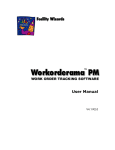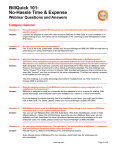Download TimeClock® 380
Transcript
TimeClock® 380 USER MANUAL & SETUP GUIDE TIMECLOCK SERIES S I M P L E T I M E - T R1A C K I N G D E V I C E TABLE OF CONTENTS Introduction & Setup ........................................................ Page 3 Programming & Accessing Lines .................................. Page 4 Settings/Use/Functions .................................................... Page 5 Troubleshooting.................................................................. Page 6 Troubleshooting.................................................................. Page 7 Troubleshooting ................................................................. Page 8 Clock Dimensions H: 6.5 in ; W: 5.5 in ; D: 1.5 in 2 INTRODUCTION Note: Read the installation instructions before you begin using the unit or attempt to connect the system to its power source and phone line. Your TimeClock includes the following: • TimeClock Terminal • AC Power Adapter • Telephone Cord • Mounting Instructions and Hardware • This Manual Required Tools and Equipment • A nearby power source with surge suppressor • A standard analog telephone line (make sure it is not a digital line) HOW TO SET UP YOUR NEW CLOCK TERMINAL Note: The TimeClock unit with its associated serial number must be added to the account before it can be successfully programmed. If not completed, the unit will display the “Unknown Serial #” message. See page 6 for more details. 1. Finding an analog phone line Your clock terminal can only be connected to a standard (ANALOG) phone line. It is not compatible with digital telephone systems. Connecting the clock to a digital telephone line may damage the unit and VOID your warranty. Digital office lines are for specific “networked” phone models and can often be identified by their special features, such as multiple lines, an intercom, call forwarding, hold, and voice mail. Tip: To tell if a phone line is suitable for use with your clock terminal, try connecting an analog telephone handset (not a multi-line phone) to the line. If you hear a dial tone and can place an outbound call, then you have found a line that is compatible with the clock terminal. 2. Connecting the power adaptor Your clock terminal has multiple ports on the back for telephone lines, expansion cables, and an AC power adapter. When connecting the TimeClock to the power source, use a surge protector to lower the risk of damage to the equipment resulting from power surges. 3. Connecting the clock terminal to a phone line Your clock terminal has multiple ports on the back for telephone lines, expansion cables, and an AC power adapter. The clock can share a phone line with your computer or fax machine, because it does not answer inbound calls and will only dial-out at a predetermined time (usually at night) to transmit the day’s punches. 3 There are two ports on the back of the unit for phone lines. Either can be used. One port must be connected to the phone line using the provided telephone cord. 5.Program clock All clocks need to be programmed before use. You will know that your clock has not been programmed if it reads “NO MERCHANT ID” when number keys are pressed. If you see this message, follow these instructions to program the clock: 1. Press * and CLEAR together. 2. Type the password: 8A0A8A5361041A. (A= ALPHA key), then ENTER. 3. Clock should say “SUCCESSFUL.” If not, repeat steps 1 and 2 carefully until the message is seen. 4. Press ENTER. Clock says “FUNCTION?” Press 0. 5. Clock says “DOWNLOAD TYPE?” Clock says “1=330, 2=380” 6. Press 2. Clock says “DOWNLOAD” Press ENTER. Type the phone #: 18882289550, press ENTER. 7. Type the serial #: 9 digits on back of clock, press ENTER. 8. Type the application ID: 747, press ENTER. 9. Type download speed: 2, then ENTER. 10. Let the clock download (takes about 2 min.). 11. Clock says “PROGRAMMED.” Press 9 to transmit. 12. When complete it will say “FINISHED,” then time and date. Note: If the line you are using to program the clock requires a “9” to dial out, enter 9 0 ALPHA before the phone number in step 6. The 9 will then be programmed into the clock, followed by a short pause (the 0 ALPHA sequence creates the hyphen on screen, representing the pause) and the steps below do not need to be followed unless the number needs to be changed again. Accessing an outside line when a prefix is required Some phone systems require callers to dial a “9” (or some other prefix) before placing an outbound call. The same situation may apply to your clock terminal. You can program your clock terminal to dial extra “prefix” digits after it has been programmed to dial the phone number by entering the following commands once your clock is connected to a power supply and is displaying the time and date: 1. 2. 3. 4. Press the FUNC/ENTER key, then press 1 on the keypad. When prompted to enter the “AUTH CODE,” type in: 123662 then press the FUNC/ENTER key. When prompted to enter the new prefix enter the number required to receive a dial tone on the phone line (9, 8, 91, etc.). Press the FUNC/ENTER key. Note: When programming a prefix, you can insert a pause between the dial prefix and the phone number to be dialed by adding a hyphen (-) character to the dial prefix. To add this character, press the 0 key followed by the ALPHA key after you have entered the digit(s) that must be dialed to access an outside line. 4 Tip: If you wish to remove the dialing prefix, simply follow steps 1, 2, and 4 above, simply skipping the step when prompted for a prefix and continuing to press FUNC/ENTER. Setting the date and time The server automatically sets the date and time on the unit. If the time is wrong, press 9 on the keypad to make the clock transmit, and it will resynchronize. The server also automatically adjusts the clock for daylight savings time and leap years. HOW TO USE YOUR NEW CLOCK SYSTEM When the clock shows the date and time, then it is ready to be used by employees. If it shows anything else, press CLEAR to get it back to the date and time. Clock In: 1. Press the IN key (the 1 key). The clock will display: “CLOCK IN”. 2. Slide your card through the slot or enter your ID number on the keypad and press ENTER, or place your finger on the PrintReader unit, if one is attached. 3. The clock will display a confirmation message: “CLOCK IN” followed by the date and time at which you clocked in. Clock Out: 1. Press the OUT key (the 2 key). The clock will display: “CLOCK OUT”. 2. Slide your card through the slot or enter your ID number on the keypad and press ENTER, or place your finger on the PrintReader, if attached. 3. The clock will display a confirmation message: “CLOCK OUT” followed by the date and time at which you clocked out. CLOCK FUNCTIONS Making the clock transmit manually (optional) The clock stores in its memory all of the punches during a single day, and sends them to the server by automatically placing a phone call at a predefined time (usually around midnight). Because of this, you will not be able to view employee activity online until the server has received the information from the clock terminal. 5 Note: The clock has a non-removable battery that maintains the memory even while the clock’s power is unplugged. All punches will accumulate until they are transmitted, even if the clock fails to transmit at its scheduled time because of a power failure or other circumstances. Pressing the FUNC/ENTER and 2 keys will display the clock’s current punches in memory. It is possible to force the clock to dial the server and transmit punches that are currently in the terminal’s memory. You can do this at any time by pressing the 9/TRANSMIT key on the keypad. Once the terminal has successfully transmitted, the punches can be viewed online. Quick reference guide to clock functions To change the dialing prefix.........................................................FUNC 1 To view the terminal’s memory...................................................FUNC 2 To view the site name.....................................................................FUNC 21 To view the dialing schedule........................................................FUNC 22 To view the number being dialed...............................................FUNC 23 TROUBLESHOOTING Terminal Error Messages Problem: Errors when swiping a card Error Messages: PLEASE TRY AGAIN, UNREADABLE CARD, BAD CARD Meaning: The card is being swiped improperly, the card is worn out and unreadable, the card being swiped is not a valid or compatible timecard, or the card reader heads on the terminal are dirty. Solution: • Verify that the black magnetic stripe is facing the right (away from the keypad) when being swiped. • Test multiple cards to determine if one or more cards are having issues. • If only one card is receiving the error, contact your service provider for a new card. • If multiple cards are receiving the error, contact your service provider to obtain a special single-use head-cleaning card. This special card is pre-moistened and is designed to pick up any stubborn debris in the card reader mechanism without scratching the heads or leaving behind harmful substances. • If none of these steps correct the problem, contact your service provider. Problem: Errors when transmitting Error Messages: WAITING FOR LINE Meaning: The clock isn’t receiving a dial tone because there is not a phone line attached, someone is using the same phone line, or the phone line is not a functioning analog line. 6 Solution: • Try transmitting again by pressing the 9 key. • Ensure that a functioning analog phone line is connected. • Make sure the line is available (not in use). • Plug in a regular telephone handset and see if you can hear a dial tone. • Make sure no configuration changes have been made to the phone line (such as newly added prefix requirement or a switch from analog to digital signal). • Take the TimeClock to another location with a different phone line and try to transmit (for example, to your home). Make sure the clock is configured with or without a prefix to match the new testing phone line. If the clock can transmit from this new location, the problem is with the original phone line. Contact your IT department or phone company for suggestions. • If the clock still is unable to transmit, contact your service provider. Error Messages: NO ANSWER, LOST COMM W/HOST, NO ENQ FROM HOST, TRANSMIT ENDED. Meaning: The clock is unable to communicate with the server and transmit punches. Solution: • Try transmitting again by pressing the 9 key. • Ensure that a functioning analog phone line is connected. • Make sure the line is available (not in use). • Plug in a regular telephone handset and see if you can hear a dial tone, if the clock dials, or if you hear a phone company error message. • Make sure no configuration changes have been made to the phone system (such as newly added prefix requirement or a switch from analog to digital signal). • Check for static on the line by listening with a handset. • Verify the phone number being dialed by pressing the FUNC/ENTER key, then 2, then 3. The number should be 18882289550. • Take the TimeClock to another location with a different phone line and \ try to transmit (for example, to your home). Make sure the clock is configured with or without a prefix to match the new testing phone line. If the clock can transmit from this new location, the problem is with the original phone line. Contact your IT department or phone company for suggestions. • If the clock still is unable to transmit, contact your service provider. Error Messages: UNKNOWN SERIAL# Meaning: The server doesn’t recognize that this clock belongs to your account. 7 Solution: Contact your service provider so they can add the clock serial number to your account. Problem: Clock will not function Error Message: NO MERCHANT ID Meaning: The terminal has not yet been programmed. Solution: Return to the setup section at the beginning of this manual and follow the programming instructions. Error Messages: PROGRAMMING ERR, DC MEMORY ERROR Meaning: The terminal’s memory may be corrupted, which can be caused by power line fluctuations. Solution: Contact your service provider in order to resolve this issue as soon as possible! In order to safeguard any punches in the memory, do not press any keys on the keypad. TimeClock 380 Setup Guide The company distributing this product does not accept liability or responsibility for inaccurate or missing information within this manual. Any and all content within this document is subject to change and may be updated at any time without notice. Copyright 2014 Printed in the USA 04/24/2014 8
















